Developers
API References
Data Subject Request API
Data Subject Request API Version 1 and 2
Data Subject Request API Version 3
Platform API
Key Management
Platform API Overview
Accounts
Apps
Audiences
Calculated Attributes
Data Points
Feeds
Field Transformations
Services
Users
Workspaces
Warehouse Sync API
Warehouse Sync API Overview
Warehouse Sync API Tutorial
Warehouse Sync API Reference
Data Mapping
Warehouse Sync SQL Reference
Warehouse Sync Troubleshooting Guide
ComposeID
Warehouse Sync API v2 Migration
Audit Logs API
Bulk Profile Deletion API Reference
Calculated Attributes Seeding API
Custom Access Roles API
Pixel Service
Profile API
Data Planning API
Group Identity API Reference
Events API
mParticle JSON Schema Reference
IDSync
Client SDKs
AMP
AMP SDK
Android
Initialization
Configuration
Network Security Configuration
Event Tracking
User Attributes
IDSync
Screen Events
Commerce Events
Location Tracking
Media
Kits
Application State and Session Management
Data Privacy Controls
Error Tracking
Opt Out
Push Notifications
WebView Integration
Logger
Preventing Blocked HTTP Traffic with CNAME
Workspace Switching
Linting Data Plans
Troubleshooting the Android SDK
API Reference
Upgrade to Version 5
Direct Url Routing
Direct URL Routing FAQ
Web
Android
iOS
Cordova
Cordova Plugin
Identity
iOS
Workspace Switching
Initialization
Configuration
Event Tracking
User Attributes
IDSync
Screen Tracking
Commerce Events
Location Tracking
Media
Kits
Application State and Session Management
Data Privacy Controls
Error Tracking
Opt Out
Push Notifications
Webview Integration
Upload Frequency
App Extensions
Preventing Blocked HTTP Traffic with CNAME
Linting Data Plans
Troubleshooting iOS SDK
Social Networks
iOS 14 Guide
iOS 15 FAQ
iOS 16 FAQ
iOS 17 FAQ
iOS 18 FAQ
API Reference
Upgrade to Version 7
React Native
Getting Started
Identity
Unity
Upload Frequency
Getting Started
Opt Out
Initialize the SDK
Event Tracking
Commerce Tracking
Error Tracking
Screen Tracking
Identity
Location Tracking
Session Management
Xamarin
Getting Started
Identity
Web
Initialization
Configuration
Content Security Policy
Event Tracking
User Attributes
IDSync
Page View Tracking
Commerce Events
Location Tracking
Media
Kits
Application State and Session Management
Data Privacy Controls
Error Tracking
Opt Out
Custom Logger
Persistence
Native Web Views
Self-Hosting
Multiple Instances
Web SDK via Google Tag Manager
Preventing Blocked HTTP Traffic with CNAME
Facebook Instant Articles
Troubleshooting the Web SDK
Browser Compatibility
Linting Data Plans
API Reference
Upgrade to Version 2 of the SDK
Alexa
Quickstart
Android
Overview
Step 1. Create an input
Step 2. Verify your input
Step 3. Set up your output
Step 4. Create a connection
Step 5. Verify your connection
Step 6. Track events
Step 7. Track user data
Step 8. Create a data plan
Step 9. Test your local app
iOS Quick Start
Overview
Step 1. Create an input
Step 2. Verify your input
Step 3. Set up your output
Step 4. Create a connection
Step 5. Verify your connection
Step 6. Track events
Step 7. Track user data
Step 8. Create a data plan
Python Quick Start
Step 1. Create an input
Step 2. Create an output
Step 3. Verify output
Server SDKs
Node SDK
Go SDK
Python SDK
Ruby SDK
Java SDK
Guides
Partners
Introduction
Outbound Integrations
Outbound Integrations
Firehose Java SDK
Inbound Integrations
Compose ID
Glossary
Migrate from Segment to mParticle
Migrate from Segment to mParticle
Migrate from Segment to Client-side mParticle
Migrate from Segment to Server-side mParticle
Segment-to-mParticle Migration Reference
Data Hosting Locations
Rules Developer Guide
API Credential Management
The Developer's Guided Journey to mParticle
Guides
Composable Audiences
Composable Audiences Overview
User Guide
User Guide Overview
Warehouse Setup
Warehouse Setup Overview
Audience Setup
Frequently Asked Questions
Customer 360
Overview
User Profiles
Overview
User Profiles
Group Identity
Overview
Create and Manage Group Definitions
Calculated Attributes
Calculated Attributes Overview
Using Calculated Attributes
Create with AI Assistance
Calculated Attributes Reference
Predictions
Predictions Overview
Predictions
View and Manage Predictions
New Predictions (Early Access)
What's Changed in the New Predictions UI
View and Manage Predictions
Predict Future Behavior
Future Behavior Predictions Overview
Create Future Behavior Prediction
Manage Future Behavior Predictions
Create an Audience with Future Behavior Predictions
Identity Dashboard (Early Access)
Getting Started
Create an Input
Start capturing data
Connect an Event Output
Create an Audience
Connect an Audience Output
Transform and Enhance Your Data
Platform Guide
Billing
Usage and Billing Report
The New mParticle Experience
The new mParticle Experience
The Overview Map
Observability
Observability Overview
Observability User Guide
Observability Troubleshooting Examples
Observability Span Glossary
Platform Settings
Audit Logs
Platform Configuration
Key Management
Event Forwarding
Event Match Quality Dashboard
Trends
System Alerts
Notifications
Introduction
Data Retention
Data Catalog
Connections
Activity
Data Plans
Live Stream
Filters
Rules
Blocked Data Backfill Guide
Tiered Events
mParticle Users and Roles
Analytics Free Trial
Troubleshooting mParticle
Usage metering for value-based pricing (VBP)
IDSync
IDSync Overview
Use Cases for IDSync
Components of IDSync
Store and Organize User Data
Identify Users
Default IDSync Configuration
Profile Conversion Strategy
Profile Link Strategy
Profile Isolation Strategy
Best Match Strategy
Aliasing
Segmentation
Audiences
Audiences Overview
Create an Audience
Connect an Audience
Manage Audiences
Audience Sharing
Audience Expansion
Inclusive & Exclusive Audiences (Early Access)
Inclusive & Exclusive Audiences Overview
Using Logic Blocks in Audiences
Combining Inclusive and Exclusive Audiences
Inclusive & Exclusive Audiences FAQ
Match Boost
FAQ
Classic Audiences
Standard Audiences (Legacy)
Predictive Audiences
Predictive Audiences Overview
Using Predictive Audiences
New vs. Classic Experience Comparison
Analytics
Introduction
Core Analytics (Beta)
Setup
Sync and Activate Analytics User Segments in mParticle
User Segment Activation
Welcome Page Announcements
Settings
Project Settings
Roles and Teammates
Organization Settings
Global Project Filters
Portfolio Analytics
Analytics Data Manager
Analytics Data Manager Overview
Events
Event Properties
User Properties
Revenue Mapping
Export Data
UTM Guide
Analyses
Analyses Introduction
Segmentation: Basics
Getting Started
Visualization Options
For Clauses
Date Range and Time Settings
Calculator
Numerical Settings
Segmentation: Advanced
Assisted Analysis
Properties Explorer
Frequency in Segmentation
Trends in Segmentation
Did [not] Perform Clauses
Cumulative vs. Non-Cumulative Analysis in Segmentation
Total Count of vs. Users Who Performed
Save Your Segmentation Analysis
Export Results in Segmentation
Explore Users from Segmentation
Funnels: Basics
Getting Started with Funnels
Group By Settings
Conversion Window
Tracking Properties
Date Range and Time Settings
Visualization Options
Interpreting a Funnel Analysis
Funnels: Advanced
Group By
Filters
Conversion over Time
Conversion Order
Trends
Funnel Direction
Multi-path Funnels
Analyze as Cohort from Funnel
Save a Funnel Analysis
Export Results from a Funnel
Explore Users from a Funnel
Saved Analyses
Manage Analyses in Dashboards
Query Builder
Data Dictionary
Query Builder Overview
Modify Filters With And/Or Clauses
Query-time Sampling
Query Notes
Filter Where Clauses
Event vs. User Properties
Group By Clauses
Annotations
Cross-tool Compatibility
Apply All for Filter Where Clauses
Date Range and Time Settings Overview
User Attributes at Event Time
Understanding the Screen View Event
User Aliasing
Dashboards
Dashboards––Getting Started
Manage Dashboards
Organize Dashboards
Dashboard Filters
Scheduled Reports
Favorites
Time and Interval Settings in Dashboards
Query Notes in Dashboards
Analytics Resources
The Demo Environment
Keyboard Shortcuts
User Segments
Data Privacy Controls
Data Subject Requests
Default Service Limits
Feeds
Cross-Account Audience Sharing
Import Data with CSV Files
Import Data with CSV Files
CSV File Reference
Glossary
Video Index
Analytics (Deprecated)
Identity Providers
Single Sign-On (SSO)
Setup Examples
Introduction
Developer Docs
Introduction
Integrations
Introduction
Rudderstack
Google Tag Manager
Segment
Data Warehouses and Data Lakes
Advanced Data Warehouse Settings
AWS Kinesis (Snowplow)
AWS Redshift (Define Your Own Schema)
AWS S3 Integration (Define Your Own Schema)
AWS S3 (Snowplow Schema)
BigQuery (Snowplow Schema)
BigQuery Firebase Schema
BigQuery (Define Your Own Schema)
GCP BigQuery Export
Snowflake (Snowplow Schema)
Snowplow Schema Overview
Snowflake (Define Your Own Schema)
Developer Basics
Aliasing
Integrations
Aarki
Audience
ABTasty
Audience
Actable
Feed
AdChemix
Event
24i
Event
AdMedia
Audience
Adobe Marketing Cloud
Cookie Sync
Server-to-Server Events
Platform SDK Events
Adobe Audience Manager
Audience
Adobe Target
Audience
Adobe Campaign Manager
Audience
AdPredictive
Feed
Adobe Experience Platform
Event
AgilOne
Event
Amazon Kinesis
Event
Amazon Redshift
Data Warehouse
Amazon SNS
Event
Amazon Advertising
Audience
Amazon S3
Event
Amazon SQS
Event
Amobee
Audience
Anodot
Event
Antavo
Feed
Apptimize
Event
Apptentive
Event
Apteligent
Event
Microsoft Azure Blob Storage
Event
Awin
Event
Bidease
Audience
Bing Ads
Event
Bluedot
Feed
Bluecore
Event
Branch S2S Event
Event
Bugsnag
Event
Cadent
Audience
Census
Feed
comScore
Event
Conversant
Event
Crossing Minds
Event
Custom Feed
Custom Feed
Databricks
Data Warehouse
Datadog
Event
Didomi
Event
Eagle Eye
Audience
Edge226
Audience
Emarsys
Audience
Epsilon
Event
Everflow
Audience
Flurry
Event
Google Analytics for Firebase
Event
Facebook Offline Conversions
Event
ForeSee
Event
Flybits
Event
FreeWheel Data Suite
Audience
Friendbuy
Event
Google Ad Manager
Audience
Google Analytics
Event
Google Analytics 4
Event
Google BigQuery
Audience
Data Warehouse
Google Enhanced Conversions
Event
Google Marketing Platform
Audience
Cookie Sync
Event
Google Marketing Platform Offline Conversions
Event
Google Tag Manager
Event
Heap
Event
Google Pub/Sub
Event
Herow
Feed
Hightouch
Feed
Hyperlocology
Event
Ibotta
Event
ID5
Kit
Impact
Event
Inspectlet
Event
Intercom
Event
ironSource
Audience
Kafka
Event
Algolia
Event
Kissmetrics
Event
InMarket
Audience
LaunchDarkly
Feed
Kubit
Event
LifeStreet
Audience
Liveramp
Audience
LiveLike
Event
MadHive
Audience
mAdme Technologies
Event
Marigold
Audience
MediaMath
Audience
Localytics
Event
Mediasmart
Audience
Microsoft Ads
Microsoft Ads Audience Integration
Microsoft Azure Event Hubs
Event
Mintegral
Audience
Monetate
Event
Movable Ink
Event
Movable Ink - V2
Event
Multiplied
Event
Nami ML
Feed
Nanigans
Event
NCR Aloha
Event
Neura
Event
OneTrust
Event
Oracle BlueKai
Event
Paytronix
Feed
Persona.ly
Audience
Personify XP
Event
Plarin
Event
Primer
Event
Qualtrics
Event
Quantcast
Event
Rakuten
Event
Reveal Mobile
Event
RevenueCat
Feed
Salesforce Mobile Push
Event
Scalarr
Event
Shopify
Feed
Custom Pixel
SimpleReach
Event
Skyhook
Event
Singular-DEPRECATED
Event
Slack
Event
Smadex
Audience
SmarterHQ
Event
Snapchat Conversions
Event
Snowflake
Data Warehouse
Snowplow
Event
Splunk MINT
Event
StartApp
Audience
Talon.One
Audience
Loyalty Feed
Event
Feed
Tapad
Audience
Tapjoy
Audience
Taplytics
Event
Teak
Audience
Taptica
Audience
The Trade Desk
Cookie Sync
Event
Audience
Ticketure
Feed
Triton Digital
Audience
TUNE
Event
Valid
Event
Vkontakte
Audience
Vungle
Audience
Webhook
Event
Webtrends
Event
White Label Loyalty
Event
Wootric
Event
Xandr
Cookie Sync
Audience
Yahoo (formerly Verizon Media)
Cookie Sync
Audience
Yotpo
Feed
YouAppi
Audience
Regal
Event
Data Warehouse
The mParticle integration for Google BigQuery allows you to forward your incoming data to a BigQuery dataset, where you can query it directly.
After configuration, mParticle’s back-end services will perform the following actions in your BigQuery dataset:
- Store each app’s data in a separate set of tables.
- Create a table for each custom event name as well as each eCommerce event name that has occurred at least once in the last 30 days. All other message types (e.g., session start, session end, screen views, etc.) will be put into a single table called [Table Prefix]_“otherevents”.
- Stream data into each table accordingly. Loaded data should be available for analysis within a few seconds of streaming insertion into a table.
- Set expiration time according to the data retention policy configured on the mParticle UI.
Note that mParticle begins loading current data into BigQuery from the time the integration is enabled. You can work with mParticle customer support team to load historical data.
BigQuery Configuration
To load data, please complete the following steps.
- Enable BigQuery in your project in Google Cloud Platform.
- From the IAM page for your project, add
mparticle-gcp-clientfacing@gcp-prod-170221.iam.gserviceaccount.comas a member with the BigQuery Job User and Project Viewer roles.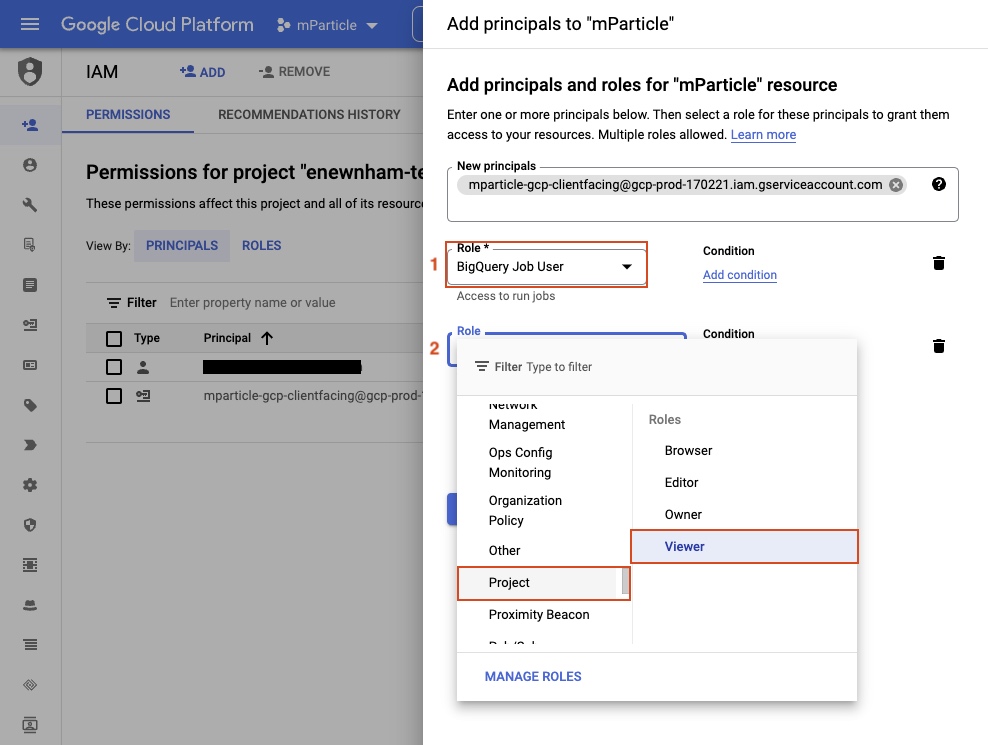
-
From the BigQuery page for your project:
- Create a dataset to load your app into.
- Click on Share Dataset on the dataset page.
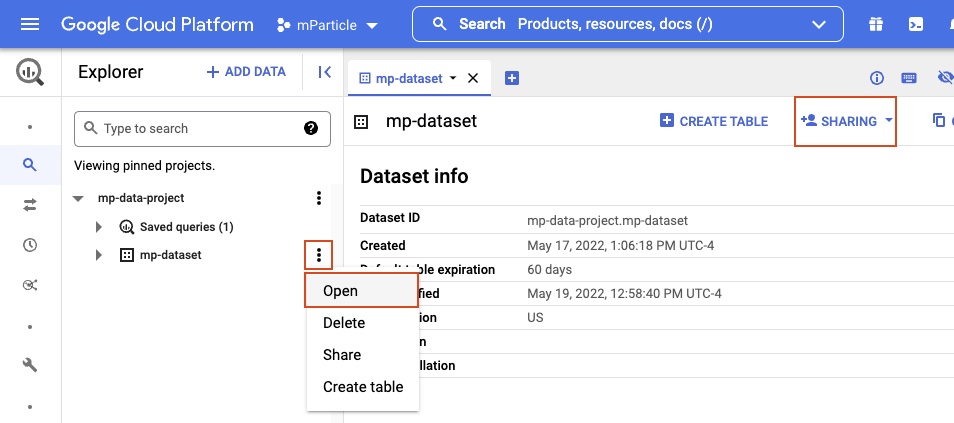
- Add
mparticle-gcp-clientfacing@gcp-prod-170221.iam.gserviceaccount.comwith the BigQuery Data Editor and Project Viewer roles.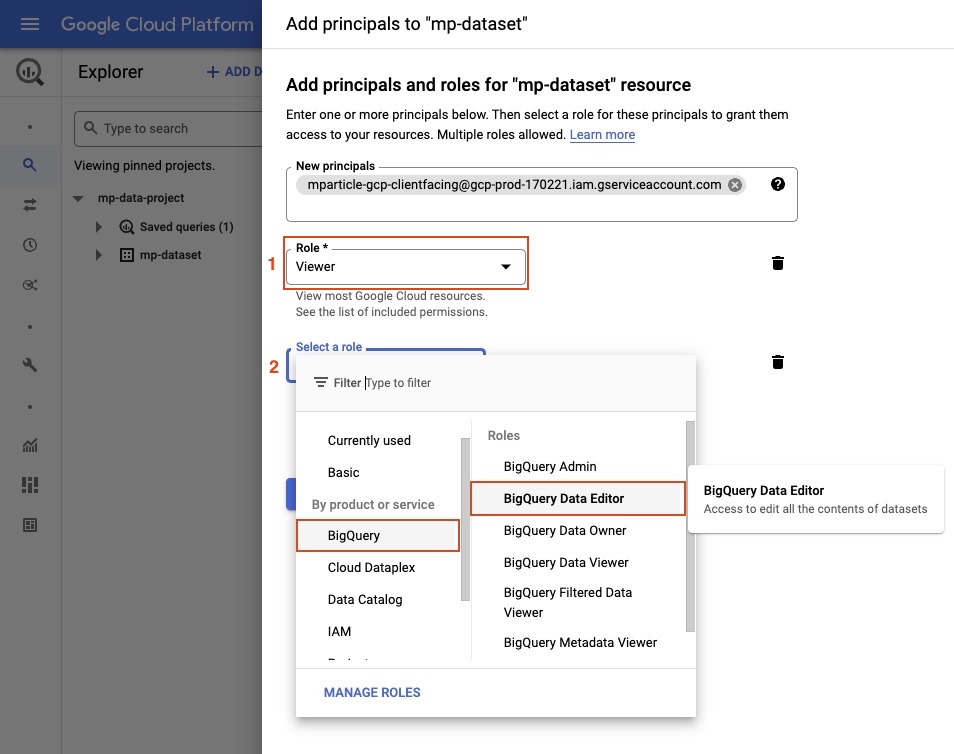
- This step is optional, if you want to sync data downstream using Storage API instead of Streaming API. The default
Use Storage API Data Syncconfiguration setting is set to false and mParticle uses Streaming API endpoint for data sync. However, if you wish to use Storage API, you must first enable access to Storage API in your Google project and then set theUse Storage API Data Syncconfiguration setting in mParticle totrue. - Log into mParticle platform, and navigate to the BigQuery page.
- Enter your BigQuery
projectId(note that it may be different from your project name) and thedatasetIdof the dataset created in step 3.
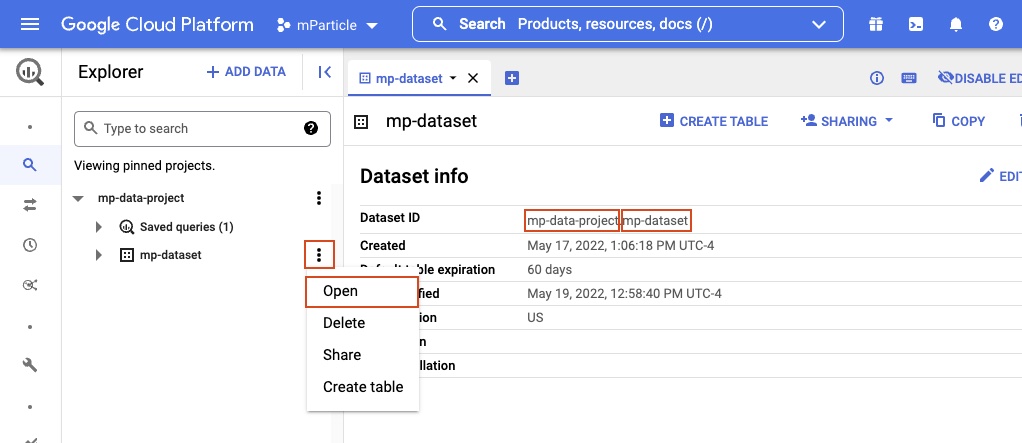
- Enter your BigQuery table prefix
- Choose from the dropdown your preferred
partition time granularity.Noneis set by default and it will use weekly sharding tables. If you choose any other option, that value will be used as it’s time-unit partitioning using the event timestamp. - BigQuery supports clustering upto four columns. Select the
Clustering Columnsin your preferred order to perform clustering. Note: If no columns are selected and partitioning is enabled in the above step, clustering will be done oneventtimestamp. Also, this setting is only applicable if partitioning is enabled. - Optionally, you may configure a data retention policy that will apply at table level for sharding or partition level for partions.
- Connect individual inputs to the BigQuery output from the Connections page. You must connect every input you want to store data for.
mParticle Setup
To set up your Google BigQuery output in mParticle:
- Navigate to Data Platform > Setup > Outputs using the left hand navigation.
- Select the Data Warehouse tab and use the Add Data Warehouse dropdown menu to add Google BigQuery. A new output should appear in the list called Google BigQuery.
- Hover your cursor over Google BigQuery and click Configure +.
- Enter a descriptive name under Configuration Name and click Save.
- You will be taken to the Settings page for your new BigQuery output. Enter the details for your BigQuery instance.
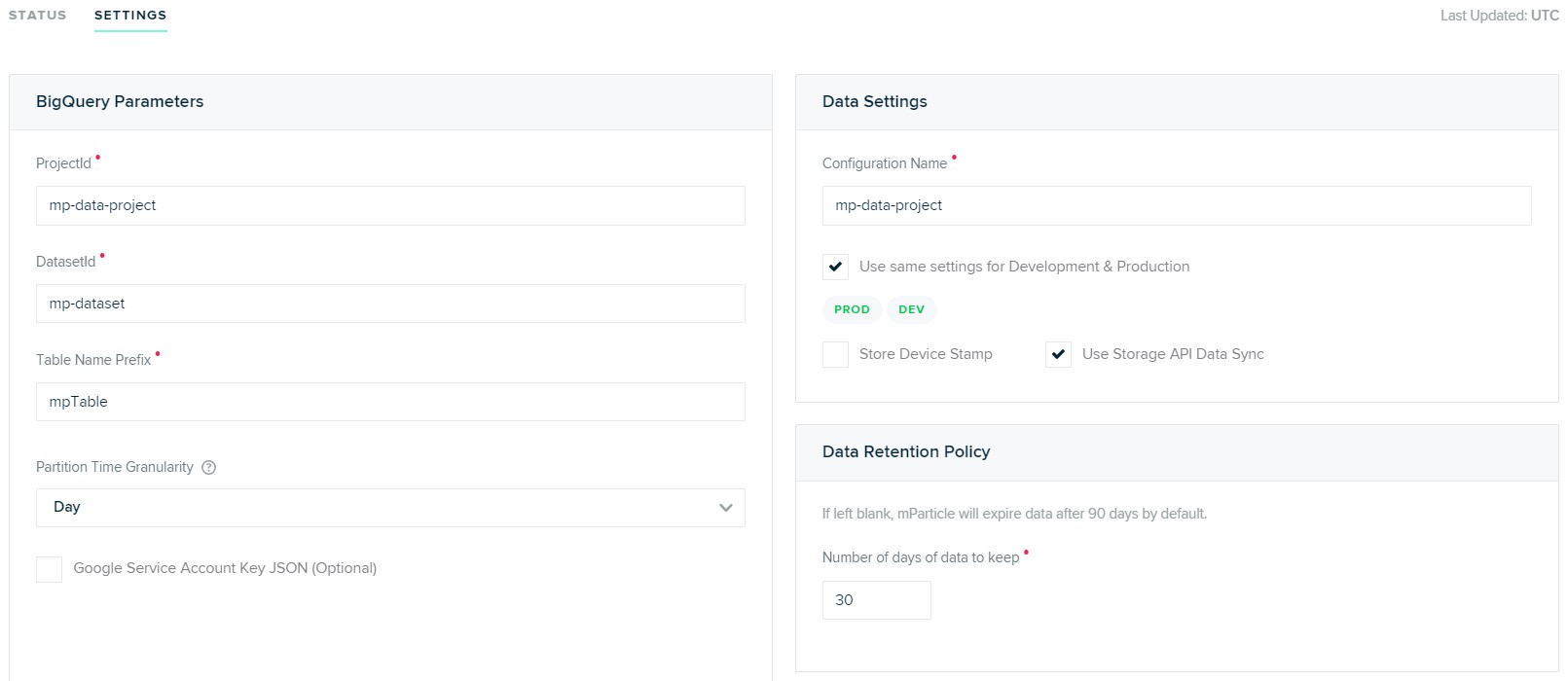
To forward data subject erasure requests to Google BigQuery, set the Forwarding Status toggle to Active and select I understand after reading the disclaimer. Once the status has been set to Active, erasure requests are sent to Google BigQuery immediately upon being received by mParticle.
Connection Settings
| Setting Name | Data Type | Default Value | Platform | Description |
|---|---|---|---|---|
| BigQuery Table Name | string |
Feed | Table name for this partner feed. If not set, the partner name will be used. Only applicable to feeds inputs, no effect on apps inputs. If “Split Partner Feed Data by Event Name” checkbox is enabled, this setting is not used. | |
| Split Partner Feed Data by Event Name | boolean |
False | Feed | If enabled, split partner feed data by event name. Otherwise load data into the same table. |
| Send Batches without Events | boolean |
True | All | If enabled, an event batch that contains no events will be forwarded. |
Optional Steps
You can upload your own JSON BigQuery service account credentials using the Google Service Account Key JSON (Optional) field in the Data Warehouse > Settings page. If you do not provide your custom credentials, mParticle’s Google service account credentials will used. The image below shows a sample JSON configuration file.
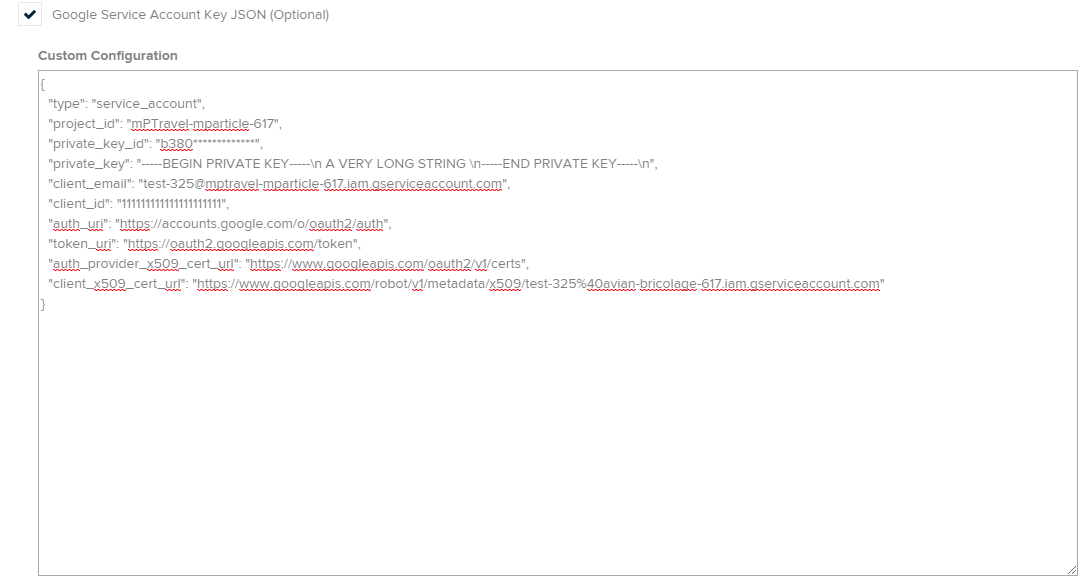
After successfully saving the configurations, data loading should start within a few minutes, and you can view the data load status on the mParticle BigQuery page.
BigQuery Schema
All of your data is stored in one single BigQuery dataset.
Each app has its own set of tables. Each table name has a table name prefix. This will be the name of your app, except for data from Feeds, for which you can customize the prefix in the Connection Settings.
By default, each custom event name and eCommerce event name have their own table in BigQuery dataset, and all other event names (e.g., session-start, session-end) are stored in a single table. The naming conversion of the table names are as follows.
- A custom event name will have a table named [Table Prefix]_event_[event type]_[event name]. For example, a Navigation type event named SignUp from an app named “my cool app” will have a table named mycoolapp_event_navigation_signup.
- An eCommerce event name will have a table named [Table Prefix]_ecomm_[event name].
- All other events are stored in a table named [Table Prefix]_otherevents.
Additionaly, the partition time granularity and clustering columns setting will impact in how data is physically stored and how table names are resolved. On top of what’s mentioned above:
- If partition time granularity is set to
None(default value) data is stored by week using a sharding approach and clustering is not performed in this case. Each table name has a date value as an appendix, the date value is the date of the Sunday of a week. For example, you’ll see table names like mycoolapp_event_navigation_signup20160424, mycoolapp_event_navigation_signup20160417, mycoolapp_event_navigation_signup20160410, etc. - Otherwise, for any other option, the choosen time frame will be used to enable the bigquery time partitioning over the eventtimestamp column, and the subsequent selected clustering columns or eventtimestamp (if no columns are selected) will be used for clustering optimizations. The choosen time partitioning option will be appended as a constant literal at the end of the table. If you choose
Dayit will end up being mycoolapp_event_navigation_signup_day or mycoolapp_event_navigation_signup_month forMonth, etc. That allows to update the partition time granularity setting with the overdraw that it’s sent to a new different table since it’s not allowed to update the configuration in an existing table.
Any update on the data retention policy setting after a table creation would not have effect on the existing tables. When using sharding that implies that the change will take effect on the next weekly table creation. In the case of partitioned tables, it will only have effect if the table prefix or partition time granularity is updated too which may lead into a new table creation (if it does not exist yet). For updates on your existing tables you will need to do a manual update from your BigQuery console.
Each table has the following fields.
| Field Name | Data Type | Data Mode | Description |
|---|---|---|---|
| appid | INTEGER | NULLABLE | mParticle app Id |
| appplatformid | INTEGER | NULLABLE | mParticle AppPlatformId, e.g., Google Now app has iOS platform and Android platform, and each platform has an unique mParticle AppPlatformId |
| appname | STRING | NULLABLE | App name |
| appversion | STRING | NULLABLE | App version |
| packagename | STRING | NULLABLE | App package name |
| apparchitecture | STRING | NULLABLE | App architecture |
| ispirated | BOOLEAN | NULLABLE | Is the device pirated? |
| applicationbuildnumber | STRING | NULLABLE | Application build number |
| isdebugsigning | BOOLEAN | NULLABLE | Is the app debug signing? |
| upgradedate | TIMESTAMP | NULLABLE | App upgrade timestamp |
| appenvironment | STRING | NULLABLE | App environment, debug or production |
| installreferrer | STRING | NULLABLE | Install referrer |
| brand | STRING | NULLABLE | Device brand |
| product | STRING | NULLABLE | Device product |
| devicename | STRING | NULLABLE | Device name |
| deviceudid | STRING | NULLABLE | Device UDID |
| manufacturer | STRING | NULLABLE | Device manufacturer |
| platform | STRING | NULLABLE | Device platform |
| osversion | STRING | NULLABLE | Device OS version |
| devicemodel | STRING | NULLABLE | Device model |
| localecountry | STRING | NULLABLE | Device’s locale country |
| localelanguage | STRING | NULLABLE | Device’s locale language |
| networkcountry | STRING | NULLABLE | Network country |
| networkcarrier | STRING | NULLABLE | Network carrier name |
| screenheight | INTEGER | NULLABLE | Device’s screen height |
| screenwidth | INTEGER | NULLABLE | Device’s screen width |
| screendpi | INTEGER | NULLABLE | Device’s screen dpi |
| deviceutcoffset | INTEGER | NULLABLE | Device UTC offset |
| osversionint | INTEGER | NULLABLE | Android OS version int |
| idfa | STRING | NULLABLE | iOS IDFA |
| googleaid | STRING | NULLABLE | Android Google Advertising ID |
| architecture | STRING | NULLABLE | Device architecture |
| istablet | BOOLEAN | NULLABLE | Is the device a tablet? |
| vendoridentifier | STRING | NULLABLE | iOS vendor identifier |
| pushtoken | STRING | NULLABLE | Push token |
| attributionserviceprovider | STRING | NULLABLE | Attribution service provider name |
| attributionpublisher | STRING | NULLABLE | Attributed publisher name |
| attributioncampaign | STRING | NULLABLE | Attributed campaign name |
| mparticleuserid | INTEGER | NULLABLE | UserId assigned by mParticle |
| customerid | STRING | NULLABLE | User’s customerID, usually this is the unique userId in your system |
| facebookid | STRING | NULLABLE | User’s Facebook user Id |
| twitterid | STRING | NULLABLE | User’s Twitter ID |
| googleuserid | STRING | NULLABLE | User’s Google ID |
| microsoftuserid | STRING | NULLABLE | User’s Microsoft ID |
| yahoouserid | STRING | NULLABLE | User’s Yahoo ID |
| STRING | NULLABLE | User’s email | |
| otheruserid | STRING | NULLABLE | “Other” type user identity |
| otheruserid2 | STRING | NULLABLE | “Other2” type user identity |
| otheruserid3 | STRING | NULLABLE | “Other3” type user identity |
| otheruserid4 | STRING | NULLABLE | “Other4” type user identity |
| isdebug | BOOLEAN | NULLABLE | True for debug environment and false for production environment |
| batchid | INTEGER | NULLABLE | A unique ID of the batch |
| batchtimestamp | TIMESTAMP | NULLABLE | Batch timestamp |
| sdkversion | STRING | NULLABLE | mParticle SDK version |
| clientip | STRING | NULLABLE | Client IP address |
| accumulatedltvvalue | FLOAT | NULLABLE | Accumulated LTV value of a user |
| entrypointtype | INTEGER | NULLABLE | Type of incoming data, 1 means from SDK and 128 means from S2S |
| countrycode | STRING | NULLABLE | Country code |
| cityname | STRING | NULLABLE | City name |
| postalcode | STRING | NULLABLE | Postal code |
| regioncode | STRING | NULLABLE | Geo region code |
| latitude | FLOAT | NULLABLE | Geo latitude |
| longitude | FLOAT | NULLABLE | Geo longitude |
| accuracy | FLOAT | NULLABLE | Geo accuracy |
| sessionid | INTEGER | NULLABLE | A unique ID of the session |
| sessionstarttimestamp | TIMESTAMP | NULLABLE | Session start timestamp |
| eventid | INTEGER | NULLABLE | A unique ID of the event |
| eventtimestamp | TIMESTAMP | NULLABLE | Event timestamp |
| messagetypeid | INTEGER | NULLABLE | Message Type Id |
| eventstarttimestamp | TIMESTAMP | NULLABLE | Event start timestamp |
| eventname | STRING | NULLABLE | Event name |
| eventtypeid | INTEGER | NULLABLE | Event type Id |
| eventlength | INTEGER | NULLABLE | How long did the event take? Represents session length in milliseonds on session end events |
| eventltvvalue | FLOAT | NULLABLE | Monetary value extracted from the event |
| dataconnectiontype | STRING | NULLABLE | Data connection type |
| exceptionhandled | BOOLEAN | NULLABLE | Handled exception or crash |
| firstseentimestamp | TIMESTAMP | NULLABLE | Timestamp of the first event on this user |
| isfirstrunevent | BOOLEAN | NULLABLE | Is this a first run event? |
| isupgradeevent | BOOLEAN | NULLABLE | Is this an app upgrade event? |
| successfullyclosed | BOOLEAN | NULLABLE | Is the last session successfully closed? Will be false if app is forcefully killed |
| applicationtransitiontypeid | INTEGER | NULLABLE | Applicaiton Transition TypeId |
| samplingpercentage | INTEGER | NULLABLE | Not used |
| ecommercescreenname | STRING | NULLABLE | eCommerce screen name |
| ecommerceisnoninteractive | BOOLEAN | NULLABLE | Is eCommerce action interactive? |
| productactiontypeid | INTEGER | NULLABLE | eCommerce Product Action Type Id 0 = unknown 1 = add_to_cart 2 = remove_from_cart 3 = checkout 4 = checkout_option 5 = click 6 = view_detail 7 = purchase 8 = refund 9 = add_to_wishlist 10 = remove_from_wishlist |
| promotionactiontypeid | INTEGER | NULLABLE | Promotion Action Type Id 0 = unknown 1 = view 2 = click |
| attauthorizationstatus | STRING | NULLABLE | iOS 14 ATT Authorization status |
| atttimestamp | TIMESTAMP | NULLABLE | iOS 14 ATT Authorization status timestamp |
| httpheaderuseragent | STRING | NULLABLE | User-Agent field from the HTTP Header |
| mparticledeviceid | STRING | NULLABLE | mParticle Device Stamp |
| eventattributes | RECORD | REPEATED | A repeated field containing a list of event attribute key value pairs |
| eventattributes.attributename | STRING | NULLABLE | Event attribute name |
| eventattributes.attributevalue | STRING | NULLABLE | Event attribute value |
| userattributes | RECORD | REPEATED | A repeated field containing a list of user attribute key value pairs |
| userattributes.attributename | STRING | NULLABLE | User attribute name |
| userattributes.attributevalue | STRING | NULLABLE | User attribute value |
| jailbroken | RECORD | REPEATED | Device’s jailbroken status |
| jailbroken.attributename | STRING | NULLABLE | Jailbroken attribute name |
| jailbroken.attributevalue | STRING | NULLABLE | Jailbroken attribute value |
| eventcustomflags | RECORD | REPEATED | Event custom flags |
| eventcustomflags.attributename | STRING | NULLABLE | Custom flag attribute name |
| eventcustomflags.attributevalue | STRING | NULLABLE | Custom flag attribute value |
| audiencemembership | RECORD | REPEATED | A repeated field containing mParticle segment ID’s the user was a member of at the time of the event |
| audiencemembership.audienceid | INTEGER | NULLABLE | mParticle segment ID |
| productimpressions | RECORD | REPEATED | A repeated field containing a list of product impressions |
| productimpressions.productimpressionlist | STRING | NULLABLE | Product impression list name |
| productimpressions.product_id | STRING | NULLABLE | Product Id |
| productimpressions.product_name | STRING | NULLABLE | Product name |
| productimpressions.product_brand | STRING | NULLABLE | Product brand |
| productimpressions.product_category | STRING | NULLABLE | Product category |
| productimpressions.product_variant | STRING | NULLABLE | Product variant |
| productimpressions.product_position | INTEGER | NULLABLE | Product position |
| productimpressions.product_price | FLOAT | NULLABLE | Product price |
| productimpressions.product_quantity | FLOAT | NULLABLE | Product quantity |
| productimpressions.product_couponcode | STRING | NULLABLE | Product coupon code |
| productimpressions.product_attributes | STRING | NULLABLE | JSON string of all product attributes |
| productimpressions.product_addedtocarttimestamp | TIMESTAMP | NULLABLE | Added to cart timestamp |
| productimpressions.product_totalproductamount | FLOAT | NULLABLE | Total product amount |
| productaction | RECORD | NULLABLE | Product action information |
| productaction.actiontype | INTEGER | NULLABLE | eCommerce Product Action Type Id 0 = unknown 1 = add_to_cart 2 = remove_from_cart 3 = checkout 4 = checkout_option 5 = click 6 = view_detail 7 = purchase 8 = refund 9 = add_to_wishlist 10 = remove_from_wishlist |
| productaction.checkoutstep | INTEGER | NULLABLE | Checkout step |
| productaction.checkoutoptions | STRING | NULLABLE | Checkout options |
| productaction.productactionlist | STRING | NULLABLE | Product action list |
| productaction.productlistsource | STRING | NULLABLE | Product list source |
| productaction.transactionid | STRING | NULLABLE | Transaction id |
| productaction.affiliation | STRING | NULLABLE | Transaction affiliation |
| productaction.totalamount | FLOAT | NULLABLE | Transaction total amount |
| productaction.taxamount | FLOAT | NULLABLE | Transaction tax amount |
| productaction.shippingamount | FLOAT | NULLABLE | Transaction shipping amount |
| productaction.couponcode | STRING | NULLABLE | Transaction coupon code |
| productactionproducts | RECORD | REPEATED | A repeated field containing a list of products associate with a product action |
| productactionproducts.product_id | STRING | NULLABLE | Product Id |
| productactionproducts.product_name | STRING | NULLABLE | Product name |
| productactionproducts.product_brand | STRING | NULLABLE | Product brand |
| productactionproducts.product_category | STRING | NULLABLE | Product category |
| productactionproducts.product_variant | STRING | NULLABLE | Product variant |
| productactionproducts.product_position | INTEGER | NULLABLE | Product position |
| productactionproducts.product_price | FLOAT | NULLABLE | Product price |
| productactionproducts.product_quantity | FLOAT | NULLABLE | Prodict quantity |
| productactionproducts.product_couponcode | STRING | NULLABLE | Product coupon code |
| productactionproducts.product_attributes | STRING | NULLABLE | JSON string of all product attributes |
| productactionproducts.product_addedtocarttimestamp | TIMESTAMP | NULLABLE | Added to cart timestamp |
| productactionproducts.product_totalproductamount | FLOAT | NULLABLE | Total product amount |
| promotionaction | RECORD | REPEATED | A repeated field containing a list of eCommerce product promotions |
| promotionaction.promotion_action_type | INTEGER | NULLABLE | eCommerce Promotion Action Type Id 0 = unknown 1 = view 2 = click |
| promotionaction.promotion_id | STRING | NULLABLE | Promotion Id |
| promotionaction.promotion_name | STRING | NULLABLE | Promotion name |
| promotionaction.promotion_creative | STRING | NULLABLE | Promotion creative |
| promotionaction.promotion_position | STRING | NULLABLE | Promotion position |
| shoppingcart | RECORD | REPEATED | A repeated field containing a list of products in a shopping cart |
| shoppingcart.product_id | STRING | NULLABLE | Product Id |
| shoppingcart.product_name | STRING | NULLABLE | Product name |
| shoppingcart.product_brand | STRING | NULLABLE | Product brand |
| shoppingcart.product_category | STRING | NULLABLE | Product category |
| shoppingcart.product_variant | STRING | NULLABLE | Product variant |
| shoppingcart.product_position | INTEGER | NULLABLE | Product position |
| shoppingcart.product_price | FLOAT | NULLABLE | Product price |
| shoppingcart.product_quantity | FLOAT | NULLABLE | Prodict quantity |
| shoppingcart.product_couponcode | STRING | NULLABLE | Product coupon code |
| shoppingcart.product_attributes | STRING | NULLABLE | JSON string of all product attributes |
| shoppingcart.product_addedtocarttimestamp | TIMESTAMP | NULLABLE | Added to cart timestamp |
| shoppingcart.product_totalproductamount | FLOAT | NULLABLE | Total product amount |
Supported identities
The following user identities can be forwarded to Google BigQuery:
customeridemailotherother2other3other4other5other6other7other8other9other10mobilenumberphonenumber2phonenumber3
Partner Feed Data
Events from each connected Partner Feed will be stored under a single table unless the Split Partner Feed Data by Event Name checkbox is enabled. You can choose the table name for each Feed in the Connection Settings. If you do not provide a name, mParticle will use the name of the Partner.
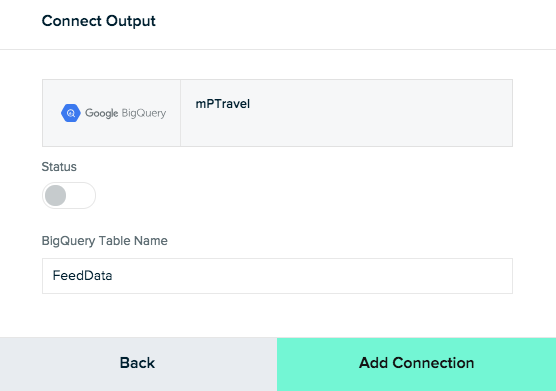
Device Application Stamp Forwarding
Events can be forwarded with a Device Application Stamp stored in the device ID column. You can enable this in the settings page for your data warehouse configuration by toggling the Store Device Stamp checkbox.
Best Practices
- Query a specific table whenever possible. Doing this lowers your BigQuery bill since BigQuery charges by how much data is queried.
- For the same reason as above, only include the fields you really want in a query whenever possible.
- When counting number of distinct elements, BigQuery use estimation by HyperLogLog by default. To get an exact count, use “count(distinct fieldName, n)”, which tells BigQuery to use estimation only if there are more than n number of unique elements.
-
When dealing with more than one repeated field, use FLATTEN operator. When using FLATTEN operator and table wildcard functions together, reference the following example:
-- calculate daily signups from facebook US users SELECT DATE(EventTimestamp), COUNT(*) FROM FLATTEN(( SELECT * FROM TABLE_QUERY([myproject:mydataset], 'table_id contains "mycoolapp"')), eventattributes) WHERE EventName = 'SignUp' AND EventAttributes.attributename = 'Sign Up Method' AND EventAttributes.attributevalue = 'Facebook' AND UserAttributes.attributename = 'Country' AND UserAttributes.attributevalue = 'US' GROUP BY 1 ORDER BY 1
- Last Updated: February 25, 2026